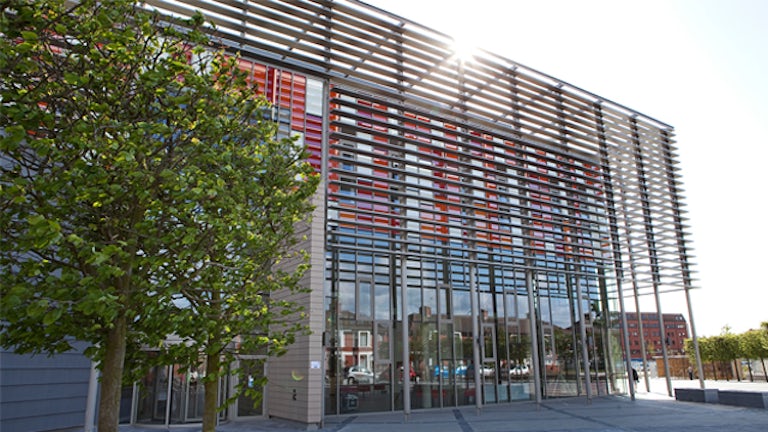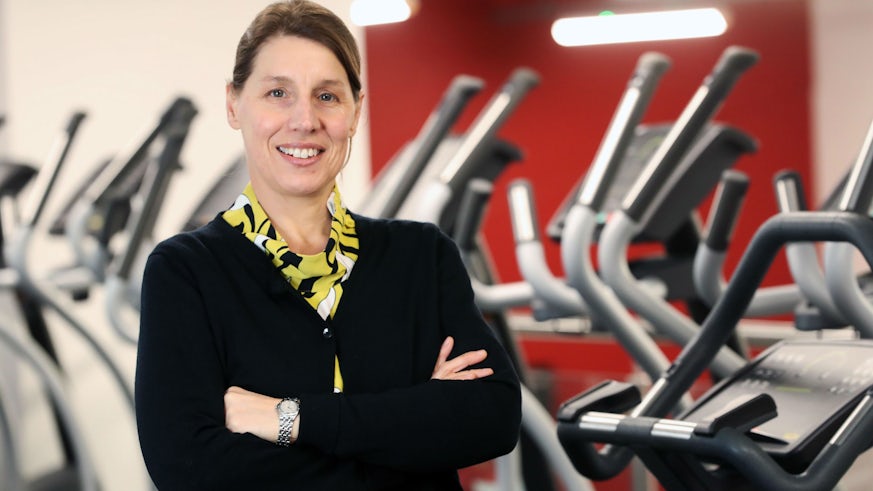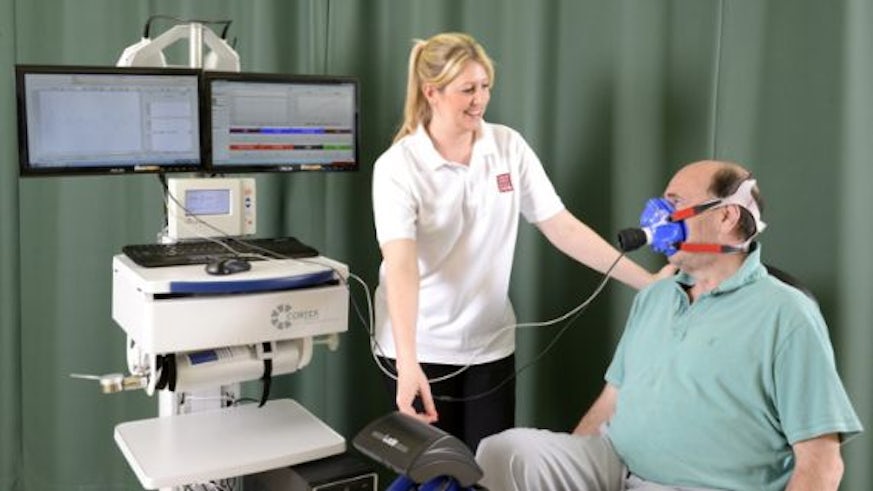
Improving opportunities for people with Huntington’s disease through physiotherapy
Our research is empowering people with Huntington’s disease to access exercise and physiotherapy to help manage their symptoms.
One in 8,000 people in the UK are diagnosed with Huntington’s. For them, and their families, it is a devastating disease.
The condition sends the brain into an unstoppable decline as crucial cells die off over time, causing the body to grind to a halt. It is usually fatal within 20 years of diagnosis.
For the researchers who have dedicated their lives to helping those with this rare neurodegenerative disease, their mission needs no explanation.
“For people who don’t know anything about Huntington’s, the most striking and recognisable thing is the involuntary movements and the difficulty people have with walking – and what drew me to working on this disease was the fact that these people weren’t being given the same opportunities as others, and were not able to access physiotherapy advice and treatment,” says Professor Monica Busse, who has worked alongside Professor Anne Rosser at Cardiff University’s Huntington’s Disease Centre for 15 years.
“I also just felt humbled by how these people could cope despite facing so many challenges. I just said to myself, ‘I know there’s something we can do for you’.”
Huntington’s disease is a life sentence.
It profoundly affects not only the person living with it, but their families too. The personal, social, and economic consequences of it can be devastating.
There is no cure, and no way to stop it getting worse, despite a huge and global research effort to understand the disease and find new therapies for it.
Over more than 15 years, Cardiff University’s Huntington’s Disease Physiotherapy Research Group has focused on one area: physical movement. It is one of the few routes to offer a better quality of life for those with the disease.
The group, led by Professor Busse, has carried out a range of research studies, randomised control trials, and a systematic review to assess whether physiotherapy and exercise can help people with Huntington’s disease – and ultimately whether it can have cognitive, physical, and social benefits.
Through this painstaking work, the group has been able to produce the first quantitative evidence that physiotherapy and regular supported exercise is beneficial. Before this, there was no standard guidance on physiotherapy or home exercise.
The findings were the catalyst for the first official physiotherapy guidelines for Huntington’s disease, and for the inclusion of physiotherapy in disease management guidelines, now used globally.
Our researchers have also supported an annual accredited course to help Huntington’s disease health professionals understand how to support people with the condition, and they have developed patient resources, also now used internationally.
“When I started out in the field, there was very little information to guide physiotherapy practice, and I would often hear people living with Huntington’s, and their families, saying that physiotherapists had told them ‘We just can’t help you’,” explains Professor Busse.
“It was clear there was a knowledge gap – health professionals just did not have the information they needed to feel confident to help these individuals.
“Thanks to our research, we now know that staying active can help to prevent loss of bodily function, and physiotherapy can help patients to cope with their changing physical function. It can also have an impact on when people with Huntington’s disease are admitted to residential care.
“Our guidelines can really help those living with Huntington’s to keep mobile, and ultimately to keep them interacting in daily life. It can make a huge difference to people’s lives, and it is actually a relatively low-cost, easy intervention.”
Professor Busse started on her path to research with an undergraduate degree in Physiotherapy, and she later completed a master’s degree in Biomechanics and Human Movement Sciences, both in her native South Africa. Aged 30 in 2002, she went on to do her PhD at Cardiff University, looking at mobility across a range of neurological conditions.
She came to research later in life, and through what she describes as a non-traditional route, having worked clinically as a physiotherapist in South Africa, the USA, and the UK for more than a decade.
Despite this, Professor Busse feels her experience in a range of clinical settings has been vital to her research career, and for dealing with such a complex disease like Huntington’s.
In short, the University’s research has changed international clinical guidelines, supported training for healthcare practitioners, and empowered patients to use exercise and physiotherapy.
More recently, during the COVID-19 pandemic, this work has proved even more vital, as patient resources meant that people with Huntington’s disease could carry on with home exercise while clinical services were paused.
“I first met a person with Huntington’s disease in clinic in 2006. At the time, there was very little in research or clinical literature to guide our practice. Nowadays, many physiotherapists are aware of our clinical guidelines and know where they can go for help – but more importantly, patients and families across the world have access to information and support,” says Professor Busse.
She is optimistic that a treatment will be found in future. Currently the best hope is in the areas of cell or gene therapy. In cell therapy, new and healthy cells are injected into a patient’s brain, whereas gene therapy looks to correct the original error by ‘editing’ or replacing the disease-causing gene or interfering with its function.
Professor Busse is hopeful that in future, the University’s expertise in delivering physical activity interventions could be a useful complementary therapy for patients who have undergone one of these treatments.
Her work continues to focus on lifestyle interventions in Huntington’s disease, and in more recent years has extended to a range of complex long-term conditions. She is also currently co-leading a research project to look at personalised self-management for people with long COVID.
“I’m very interested in studying different aspects of Huntington’s disease, and in particular the relationship between sleep, physical activity, and nutrition and the condition,” she explains.
“We have started this work in the DOMINO-HD consortium, where we’re exploring how digital technologies, such as wearable fitness trackers, can be used to support people with Huntington’s disease.”
When asked what she feels is her biggest achievement, Professor Busse says: “Being a wife and mother of two amazing children while managing an academic career.
“It’s always been a balancing act, but I’m lucky to have had a very supportive husband and family, and an incredible role model in Professor Anne Rosser from early on in my career.
“She showed me that it was possible to balance a clinical research career with family life, even when I doubted I could.”

Huntington’s disease and current treatment guidelines
Huntington’s disease is a rare, inherited, neurodegenerative condition that affects 12 people in every 100,000. It damages nerve cells in the brain, gets worse over time, and affects people’s memory, behaviour, and mobility. Symptoms usually begin to show between the ages of 30 and 50, and there is currently no cure.
Current guidelines for people living with Huntington’s recommend physiotherapy assessment advice from the point of diagnosis. Clinicians should consider the patient’s impairments, goals, disease stage, and any potential for harm. They should also provide specific interventions to target walking, posture, and balance problems in the later stages of the disease.
Recommendations for people living with Huntington’s disease include a lifestyle with regular aerobic exercise, such as swimming, brisk walking, cycling, or dance. Improving and maintaining fitness in the early stages of the disease is beneficial, particularly through focusing on exercises like yoga that support strength, balance, and flexibility.
It is also recommended to practise activities that help maintain independence, such as sitting down and standing up, as well as getting up from the ground in the event of a fall. Breathing exercises and advice on how to sit comfortably are also important.
As the disease progresses, current treatment guidelines recommend advising caregivers on how people living with Huntington’s can maintain physical activity.

The Cardiff University Huntington’s Disease Centre
Our Huntington’s Disease Centre aims to bring together clinicians and researchers from South Wales and beyond, in one of the UK’s leading centres for co-ordinating research into the disease.
Meet the team
Key contacts
Related news stories
Publications
- Busse, M. et al. 2017. Physical activity self-management and coaching compared to social interaction in Huntington’s disease: Results from the ENGAGE-HD randomized, controlled, pilot feasibility trial. Physical Therapy 97 (6), pp.625-639. (10.1093/ptj/pzx031)
- Busse, M. et al. 2013. A randomized feasibility study of a 12-week community-based exercise program for people with Huntington's Disease. Journal of Neurologic Physical Therapy 37 (4), pp.149-158. 1557-0576/13/3704-0149. (10.1097/NPT.0000000000000016)
- Khalil, H. et al. 2013. What effect does a structured home-based exercise programme have on people with Huntington's disease? A randomized, controlled pilot study. Clinical Rehabilitation 27 (7), pp.646-658. (10.1177/0269215512473762)
- Quinn, L. et al. 2013. Reliability and minimal detectable change of physical performance measures in individuals with pre-manifest and manifest Huntington disease. Physical Therapy 93 (7), pp.942-956. (10.2522/ptj.20130032)
- Busse, M. et al. 2008. Physical therapy intervention for people with Huntington disease. Physical Therapy 88 (7), pp.820-31. (10.2522/ptj.20070346)







